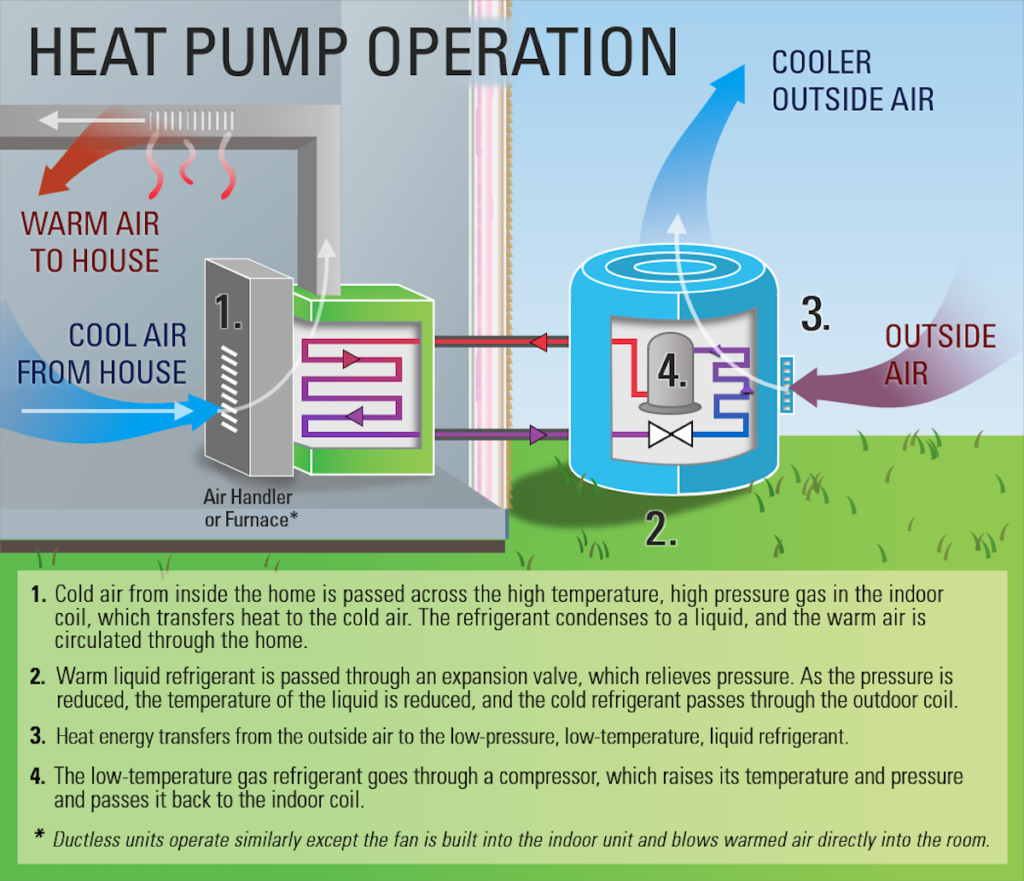
By Will Brownsberger
Edited and reprinted with permission from Brownsberger’s blog, willbrownsberger.com/heat-pumps.
Many people are seeking to shrink their personal carbon footprint. Many also seek to participate constructively in the energy systems transitions necessary to achieve net zero carbon emissions.
There is a broad consensus among climate planners in Massachusetts that we need to electrify heating in buildings. However, each building raises unique challenges. This article attempts to summarize the environmental and consumer considerations for people seeking to electrify home heating. Many of these issues are explored in more depth in this heat pump outline.
Several good heat pump applications are also beyond the scope of this article:
- It is easier to build heat distribution systems (ducts or piping) that are fully compatible with efficient heat pumps in a new home. I generally favor electrified heating in all new construction.
- When adding heating to an unheated or inadequately heated part of a home, a heat pump is likely to be a good solution, especially since it will also provide air conditioning. A single-head mini-split installed to serve a single room is often relatively inexpensive and often relatively efficient.
- When adding, expanding, or replacing air conditioning, heat pumps are likely to be a good solution. Anecdotal reports and crude survey evidence indicate that air conditioning upgrades may be the most common occasion for a heat pump installation. Heat pumps are more efficient and quieter than conventional air conditioners and they provide heating. Air conditioning is becoming more necessary for health as temperatures rise. It’s reasonable to add or expand air conditioning—even though additional cooling will mean increased greenhouse gas emissions.
- Ground source heat pumps are not usually an option for people in my district because they usually require large lots. They are considerably more expensive to install than electric heat pumps, but they are less expensive and more environmentally beneficial to run.
Environmental benefits of heat pumps
A heat pump conversion from an existing heating system is likely to reduce greenhouse gas emissions:
- When running in place of electric resistance heating, heat pumps substantially reduce electricity use and related emissions.
- When running in place of fossil fuel heating, heat pumps are typically efficient enough that they will reduce greenhouse gas emissions. In other words, they are typically efficient enough that the fossil emissions they will eliminate from heating in the home will exceed the emissions that result from increased demand on our electric power grid.
- The environmental operating benefits are greater for conversions from oil and propane than for conversions from natural gas.
- Typical heat pump installations replacing natural gas are beneficial, but the net benefits are smaller and more sensitive to inefficiencies in the particular installation. (See the discussion of heat pump performance and efficiency challenges on willbrownsberger.com. For an example of a net-benefit analysis, see slide 18 in the presentation on heat pump retrofits on my website.)
Every heat pump installation should be designed carefully to assure efficient operation that maximizes environmental benefits and minimizes operating costs. Good design is also important for comfort. Most people will want to work with a heat pump coach or consultant to assure that they are getting objective advice as to how to achieve the best results in their own home.
Putting aside the minority of installations where heat pumps are so inefficient that they do not generate greenhouse gas savings, the more a heat pump runs and replaces heat from the existing heating system, the more savings it generates.
People seeking to benefit the environment should use heat pumps in a consistent and disciplined way to displace heating, either by doing a full replacement of existing heating, or using integrated controls as recommended by Mass Save. With integrated controls, your legacy system will only run when it is quite cold out. Mass Save has a major study underway which will shed light on the extent to which consumers achieve both comfort and operating savings with integrated controls.
Heat pumps can leak refrigerants. These refrigerants are potent greenhouse gasses. If heat pumps are used heavily, the savings they generate will likely exceed substantially the expected harms from leaks. If the heat pumps are lightly used, there is a real risk that harms from leaks will exceed operating environmental benefits.
If replacing an air conditioning system, then the risks of environmental harms from refrigerant leaks from heat pumps are not necessarily greater than the already-existing risks of leaks from the air conditioning system and may not need to be weighed in the decision. However, it is important to confirm the lawful disposal of harmful refrigerants.
Coming technology improvements
Over the next two or three years, the heat pump and air conditioner markets are likely to shift to refrigerants that are more efficient and less potent as greenhouse gasses. Current industry statements suggest this will result in an improvement of approximately 10% in efficiency. Additionally, the risks of significant environmental harms from leaks will go down by a factor of three or more.
These changes will increase the net environmental benefits of heat pump installations. They are most likely to be worth waiting for where the conversion is from natural gas, especially when the planned conversion is only partial; in partial natural gas conversions, the risk that leaks will offset operating benefits is greatest. The case for waiting is also stronger if the heating system is relatively young and would be fully replaced.
Think creatively about your home
If you have limited resources, it is important to think carefully about your options for spending money to benefit the environment—insulation measures or partial heat pump conversions may stretch your limited resources further than a full heat pump conversion. In some heat pump conversions, especially those from natural gas, the cost per ton of greenhouse gas savings may exceed $1,000 per ton, well above the Biden administration’s estimated social harms from carbon emissions.
Every home is different and different households have different needs. For example, an empty-nester couple staying in a single-family home might be able to save money and carbon emissions by turning their fossil heat system way down and adding small mini split heat pumps in only a couple of heavily used rooms. Constituents have shared many hybrid permutations that keep them comfortable while saving costs and emissions.
The cost and benefits of insulation and other energy efficiency measures are beyond the scope of this article. The possible savings from these measures depend on specifics of the home. However, in some cases, the payback can be quick. Mass Save requires basic weatherization as a condition of larger rebates and covers 75% to 100% of the cost.
Cost considerations with heat pumps
In Massachusetts, given our relatively high electric rates, heat pump conversions from fossil fuels are not usually motivated by cost considerations. The benefit-cost analysis of heat pump conversions depends on several factors.
What heating fuel are you converting from?
- Converting from electric resistance heat, heat pumps will likely cut your operating costs by 50% or more. Depending on your electric rates and on your home’s energy efficiency, this may be enough to recover your capital costs.
- Converting from oil or propane heat to heat pumps, cost savings will depend on market conditions and your own local electric rates. Electric rates vary substantially across communities in Massachusetts. Do not trust an online savings calculator that does not ask for your fuel cost and electric rate assumptions. Generally, in an oil or propane conversion, savings are uncertain and likely to be very modest.
- Converting from natural gas to heat pumps will rarely result in operating cost savings (and may result in increased costs) unless the historical price relationship between the cost of gas and the cost of electricity changes substantially in the future.
- See more discussion of fuel prices and operating economics on willbrownsberger.com.
How much will you actually use your heat pump?
Substantial fuel displacement is only guaranteed in whole home installations; in partial conversions, where the existing heating system continues to serve part of the load, results will depend heavily on customer behavior.
How much does your heat pump cost to install?
Installation costs have risen substantially above projected levels due in part to high incentives. Installation costs vary widely across homes. Each consumer will need to solicit several bids and get a feel for how installers view their particular situation. Each installer will bring a different perspective to the possibilities for your home.
What is the condition of the systems that the heat pump is replacing?
If your heating system is aging, then it’s reasonable to factor in a percentage of replacement costs as an offset to your initial investment.
In addition to these heating system factors, you may consider costs or savings associated with replacements or expansions of air conditioning.
Policy Implications
This article is not intended as a comment on public policy. While some of the points made here are relevant to heat pump policy, there are many other considerations which have to be part of any discussion of policy. In particular, even if heat pump prices have risen and some heat pump measures have a very high cost-per-ton of carbon saved, continued heavy incentives may be fully justified by the need to provide clear and steady support for small businesses and individuals who are seeking to become heat pump suppliers or installers.
Feedback
Senator Brownsberger very much appreciates feedback and welcomes questions at william.brownsberger@masenate.gov or 617-771-8274 (cell).
Will Brownsberger is the senator for the Suffolk and Middlesex District of Massachusetts, which includes Belmont.



Sorry, the comment form is closed at this time.